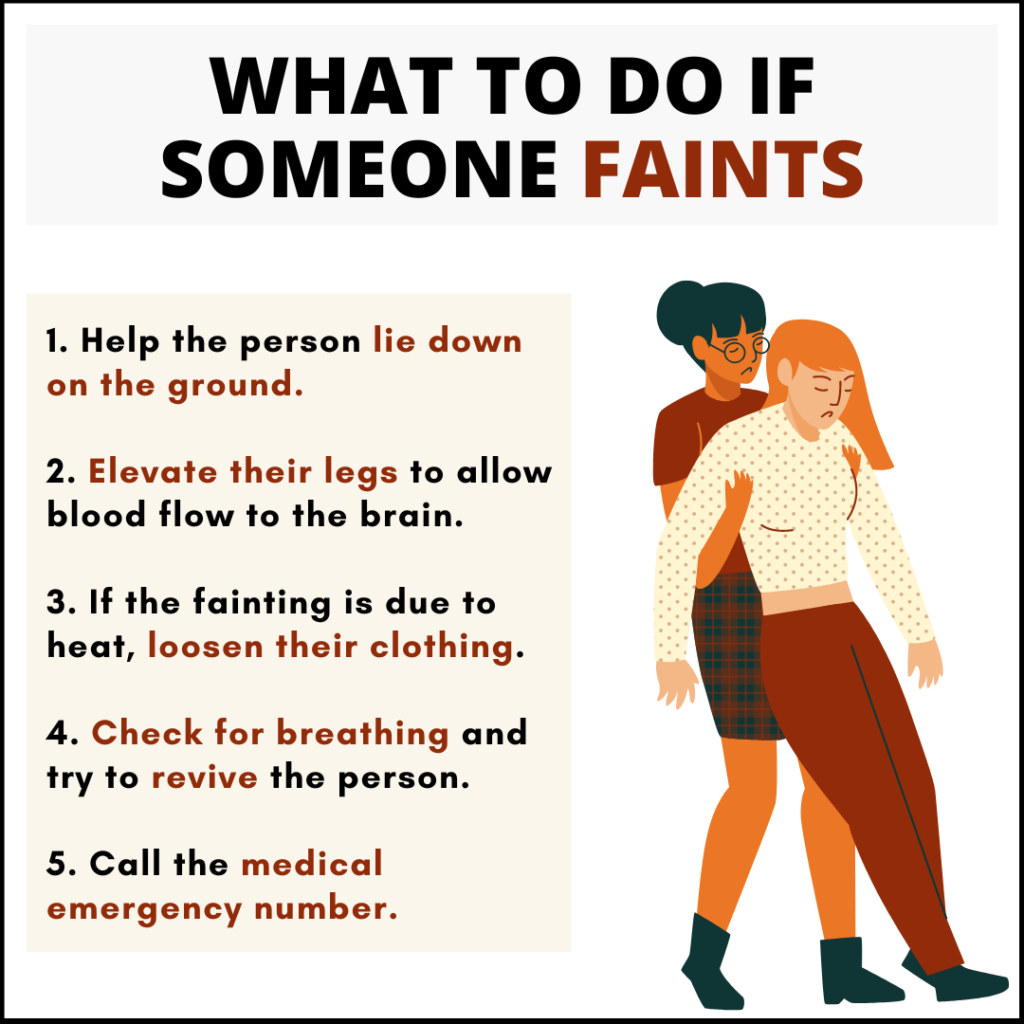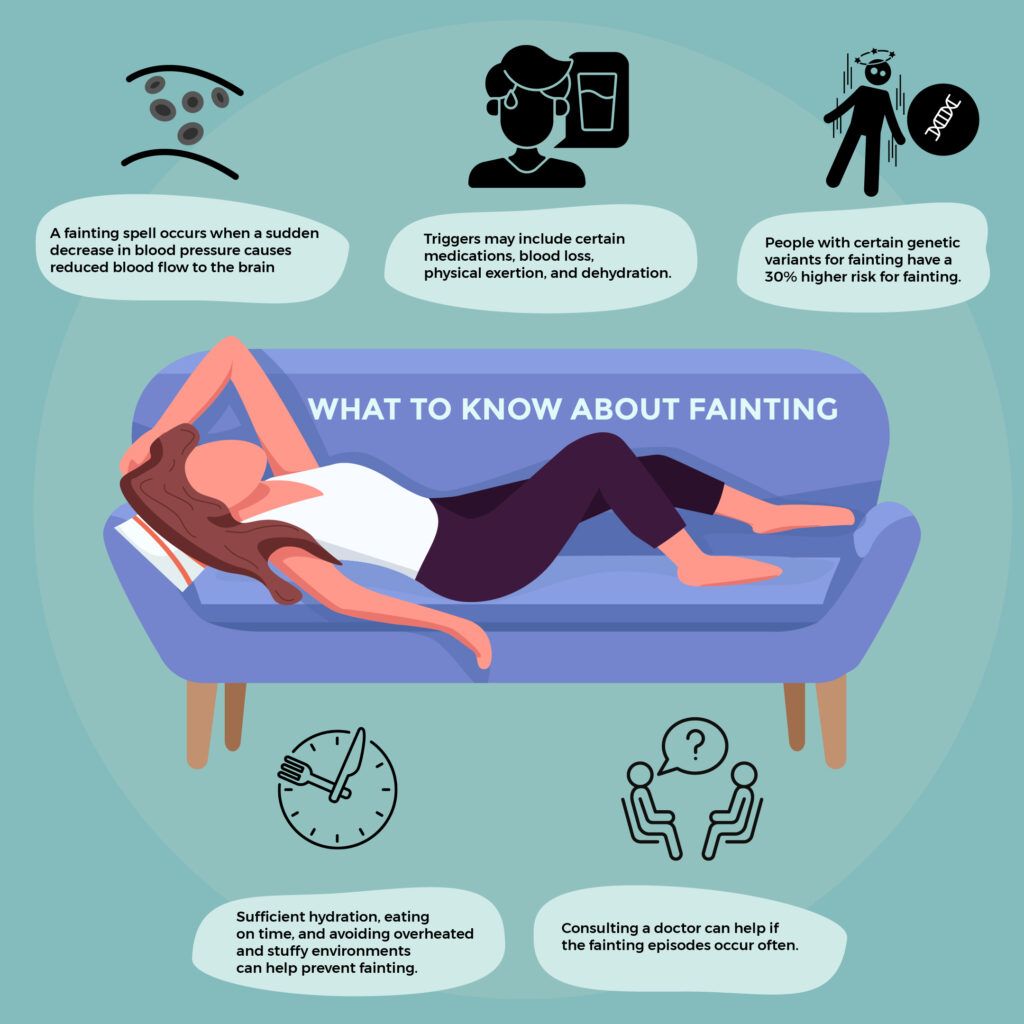What Causes A Person To Faint?
About 1 in 4 people faint at some point in their lives.
Fainting or passing out is when an individual loses consciousness for a short period.
This commonly occurs when a sudden decrease in blood pressure causes reduced blood flow to the brain.
A fainting episode typically lasts for a few seconds or minutes.
Though fainting is usually not a cause of concern, it is important to seek medical attention if it happens too often.
A few other causes of fainting include:
- Cardiac syncope: A type of fainting that occurs due to a heart problem. Many heart conditions reduce the amount of oxygenated blood pumped to the brain, resulting in fainting.
- Situational syncope: Some body movements or functions like urination, the passage of stools, stretching, or coughing can result in a sudden decrease in blood pressure and cause an individual to faint.
- Vasovagal syncope: Many people may faint when they experience a stressful event, such as the sight of blood, emotional or physical pain, and trauma. The stressful event triggers the body’s vasovagal reaction, slowing the heart and reducing the amount of blood pumped. This causes a drop in blood pressure and the amount of blood available to the brain, resulting in fainting.
- Medications: Some drugs like diuretics, calcium channel blockers, and ACE inhibitors may affect blood pressure levels, triggering fainting.
Image: How to help someone who has fainted
Risk Factors For Fainting
A few factors increase the risk of fainting, and these include:
- Taking medications that lower blood pressure
- Excessive consumption of alcohol
- Blood loss
- Dehydration due to vomiting or diarrhea
- Not consuming enough fluids
- Lung disease
- Environmental factors like extreme heat
- Excessive physical exertion
Is Fainting Genetic?
Does Fainting Run In Families?
Fainting is not just caused by external factors. Your genes have a role to play as well.
A study published in the Neurology journal stated that fainting has a strong genetic component, but it may be affected by multiple genes and environmental factors.
The same study also said that the frequency of fainting among non-twin relatives was low, which suggests that the condition is neither inherited nor caused by a single gene.
Is There A Fainting Gene?
Danish researchers found that a part of chromosome 2 may increase an individual’s risk for fainting.
Humans have 23 pairs of chromosomes, i.e., 46 chromosomes.
An individual can have one, two, or no fainting-related genes on chromosome 2.
People with the fainting risk variant on both versions of chromosomes have a 30% higher risk of fainting than those without the variant.
Though some studies indicate that women may be at a higher risk of fainting than men, the exact reason for this is unknown.
Image: 5 facts about fainting
Tips To Prevent Fainting
If you have experienced fainting in the past, it is important to observe which activities trigger it. Knowing what triggers your fainting spells can guide you toward avoiding them.
A few strategies you can use to prevent fainting are:
- Avoid the trigger factors
- Make a fist
- Tense your arms
- Move your toes
- Cross your legs
- Squeeze your thighs together
If your fainting episodes are due to a medical condition, your doctor will recommend suitable measures to prevent it.
Summary: Is Fainting Genetic?
- Fainting is when an individual loses consciousness for a brief period.
- The most common cause of fainting is a sudden drop in blood pressure, which reduces blood flow to the brain.
- A few common causes of fainting are heart conditions, sudden body movements, facing a stressful situation, the use of certain medications, and dehydration.
- Gene variants on chromosome 2 may increase an individual’s risk for fainting.
- Avoiding triggers and managing medical conditions that may cause fainting can prevent frequent fainting episodes.
References
- https://www.sciencedaily.com/releases/2012/08/120806161727.htm
- https://www.frontiersin.org/articles/10.3389/fcvm.2019.00175/full
- https://www.webmd.com/brain/news/20120806/fainting-may-run-in-the-family
- https://www.sciencedaily.com/releases/2019/05/190516103713.htm
- https://www.medicinenet.com/script/main/art.asp?articlekey=221340
- https://my.clevelandclinic.org/health/symptoms/21699-fainting






